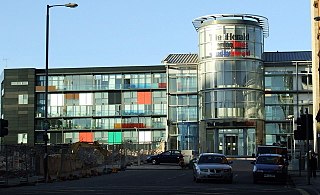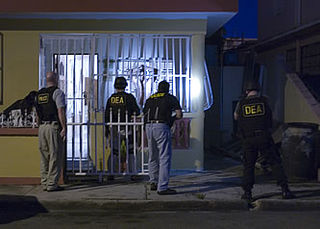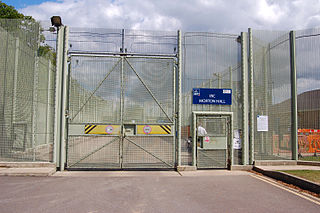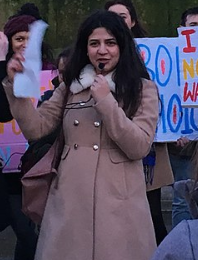The Ay family are Kurdish asylum seekers who became the centre of a controversy in 2003 surrounding the policy of locking up children in high security immigration detention centres in the United Kingdom. [1]
An asylum seeker is a person who flees their home country, enters another country and applies for asylum, i.e. the right to international protection, in this other country. An asylum seeker is a type of migrant and may be a refugee, a displaced person, but not an economic migrant. Migrants are not necessarily asylum seekers. A person becomes an asylum seeker by making a formal application for the right to remain in another country and keeps that status until the application has been concluded. The applicant becomes an "asylee" if their claim is accepted and asylum is granted. The relevant immigration authorities of the country of asylum determine whether the asylum seeker will be granted protection and become an officially recognised refugee (asylee) or whether asylum will be refused and asylum seeker becomes an illegal immigrant who has to leave the country and may even be deported. The asylum seeker may be recognised as a refugee and given refugee status if the person's circumstances fall into the definition of "refugee" according to the 1951 Refugee Convention or other refugee laws, such as the European Convention on Human Rights – if asylum is claimed within the European Union. However signatories to the refugee convention create their own policies for assessing the protection status of asylum seekers, and the proportion of asylum applicants who are rejected varies from country to country and year to year.

The United Kingdom of Great Britain and Northern Ireland, commonly known as the United Kingdom or Britain, is a sovereign country located off the northwestern coast of the European mainland. The United Kingdom includes the island of Great Britain, the northeastern part of the island of Ireland, and many smaller islands. Northern Ireland is the only part of the United Kingdom that shares a land border with another sovereign state, the Republic of Ireland. Apart from this land border, the United Kingdom is surrounded by the Atlantic Ocean, with the North Sea to the east, the English Channel to the south and the Celtic Sea to the south-west, giving it the 12th-longest coastline in the world. The Irish Sea separates Great Britain and Ireland. The United Kingdom's 242,500 square kilometres (93,600 sq mi) were home to an estimated 66.0 million inhabitants in 2017.
Salih and Yurdugal Ay were Kurds seeking asylum who came to the UK to escape persecution in Turkey, it being alleged that Mrs Ay had been locked up and raped by Turkish militia. They brought their four children with them and settled in Gravesend in Kent where the children attended local schools. Salih was deported to Germany and from there further deported back to Turkey where he disappeared. [2]

Turkey, officially the Republic of Turkey, is a transcontinental country located mainly on the Anatolian peninsula in Western Asia, with a small portion on the Balkan peninsula in Southeast Europe. East Thrace, the part of Turkey in Europe, is separated from Anatolia by the Sea of Marmara, the Bosphorous and the Dardanelles. Turkey is bordered by Greece and Bulgaria to its northwest; Georgia to its northeast; Armenia, the Azerbaijani exclave of Nakhchivan and Iran to the east; and Iraq and Syria to the south. Istanbul is the largest city while Ankara is the capital. Approximately 70 to 80 per cent of the country's citizens identify as Turkish. Kurds are the largest minority at anywhere from 15 to 20 percent of the population.

Kent is a county in South East England and one of the home counties. It borders Greater London to the north-west, Surrey to the west and East Sussex to the south-west. The county also shares borders with Essex along the estuary of the River Thames, and with the French department of Pas-de-Calais through the Channel Tunnel. The county town is Maidstone.
In 2002, Yurdugal Ay and her children were suddenly removed from their home by immigration officials and taken to Dungavel detention centre in South Lanarkshire, Scotland. They were all put together in one room where they lived for a year inside a razor wire surrounded compound. Yurdugal could not speak English very well so it was up to her eldest daughter, Beriwan Ay aged 13, to negotiate for her mother and her sisters. The family were threatened with deportation but appealed. It was claimed by the authorities that they had brought the long stay at Dungavel upon themselves by this appeal.

Dungavel Immigration Removal Centre is an immigration detention facility in South Lanarkshire, Scotland, near the town of Strathaven that is also known as Dungavel Castle or Dungavel House. It is operated by the American private prison firm GEO Group, under contract with the law-enforcement command Border Force for its detention of immigrants for the Home Office. It is the only such facility in Scotland.

South Lanarkshire is one of 32 unitary authorities of Scotland. It borders the south-east of the City of Glasgow and contains some of Greater Glasgow's suburbs. It also contains many towns and villages. It also shares borders with Dumfries and Galloway, East Ayrshire, East Renfrewshire, North Lanarkshire, the Scottish Borders and West Lothian. It includes part of the historic county of Lanarkshire.
Conditions in the privatised detention centre, run by the American private-prison operator GEO Group, were far from satisfactory. There were no proper education facilities for the children. The children were treated as prisoners with just 2 hours exercise outside allowed each day. There were very limited play facilities. The Children's Commissioner for Scotland described the situation there as 'morally distressing' and threatened to report the UK Government and Scottish Executive to the United Nations Convention on the Rights of the Child. The British Home Secretary at the time David Blunkett appeared to disregard various conventions on human rights requirements about not imprisoning children claiming that the other alternative — separating the children from their parents and putting them into care — was also undesirable.

The GEO Group, Inc. (GEO) is a Florida-based company specializing in privatized corrections, detention, and mental health treatment. It maintains facilities in North America, Australia, South Africa, and the United Kingdom. As of 2017, GEO Group shares are mainly held by institutional investors.

David Blunkett, Baron Blunkett, is a British former politician, having represented the Sheffield Brightside and Hillsborough constituency for 28 years through to 7 May 2015 when he stepped down at the general election. Blind since birth, and coming from a poor family in one of Sheffield's most deprived districts, he rose to become Education and Employment Secretary, Home Secretary and Work and Pensions Secretary in Tony Blair's Cabinet following Labour's victory in the 1997 general election.
Bishop John Mone met Beriwan Ay on a visit to Dungavel and was appalled by what he discovered. During a later visit he smuggled a video camera into the centre [clergymen not being searched there], interviewed Beriwan to camera and released the video to the media. This was shown on BBC television's Newsnight programme. The case was also taken up by the Herald newspaper. [3]
John Aloysius Mone was the third Roman Catholic Bishop of Paisley.

Newsnight is a current affairs programme, that provides "in-depth investigation and analysis of the stories behind the day's headlines." It broadcasts on weekdays, usually at 10:30 pm on BBC Two, and is also available on BBC iPlayer.

The Herald is a Scottish broadsheet newspaper founded in 1783. The Herald is the longest running national newspaper in the world and is the eighth oldest daily paper in the world. The title was simplified from The Glasgow Herald in 1992. Following the closure of the Sunday Herald, the Herald on Sunday was launched as a Sunday edition on 9 September 2018.
A media storm ensued. The Scottish Executive had responsibilities for children's welfare in Scotland but was clashing with a non devolved act from the UK parliament in Westminster. Eventually the Ay family lost their appeal against deportation and were forcibly deported via Stansted Airport to Germany where they were granted asylum. [4] On 27 October 2006 BBC Radio 4 broadcast a play by Frank Deasy called Broken English portraying the case from Beriwan Ay's point of view. [5]

Scotland is a country that is part of the United Kingdom. It covers the northern third of the island of Great Britain, with a border with England to the southeast, and is surrounded by the Atlantic Ocean to the north and west, the North Sea to the northeast, the Irish Sea to the south, and more than 790 islands, including the Northern Isles and the Hebrides.

The Palace of Westminster serves as the meeting place of the House of Commons and the House of Lords, the two houses of the Parliament of the United Kingdom. Commonly known as the Houses of Parliament after its occupants, the Palace lies on the north bank of the River Thames in the City of Westminster, in central London, England.

Germany, officially the Federal Republic of Germany, is a country in Central and Western Europe, lying between the Baltic and North Seas to the north and the Alps, Lake Constance and the High Rhine to the south. It borders Denmark to the north, Poland and the Czech Republic to the east, Austria and Switzerland to the south, France to the southwest, and Luxembourg, Belgium and the Netherlands to the west.
In January 2012 the Home Office agreed to pay them a 6-figure sum of compensation in an out of court settlement following a civil action against the UK government for the ordeal of their time in detention. [6]





